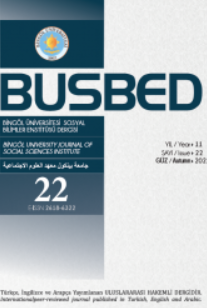ENERJİ ALANINDA YAPILAN AR-GE HARCAMALARININ ENERJİ TÜKETİMİ ÜZERİNDEKİ ETKİSİ: ALMANYA ÖRNEĞİ
THE IMPACT OF R&D EXPENDITURES IN THE ENERGY FIELD ON ENERGY CONSUMPTION: THE CASE OF GERMANY
Author(s): Mustafa NaimoğluSubject(s): National Economy, Energy and Environmental Studies, Environmental and Energy policy, Transformation Period (1990 - 2010), Present Times (2010 - today)
Published by: Bingöl Üniversitesi Sosyal Bilimler Enstitüsü
Keywords: Energy consumption; R&D expenditure; Renewable Energy; Non-Renewable Energy; Nuclear Energy; Germany;
Summary/Abstract: Compared to 1990, Germany's GDP increased by 54% in 2019; renewable energy R&D expenditures increased by 99% and renewable energy use increased by 84811% (excluding hydro), while total energy consumption decreased by 14% and total energy losses 415%. In other words, Germany increased its use of renewable energy with its high income and managed to reduce its total energy consumption and total energy losses significantly. In the same period, France and Italy, which are partners between the G7 countries and the European Union countries, increased their total energy consumption by 7% and 0.71%. In comparison, Germany achieved a remarkable reduction of 14%. Therefore, the difference of this study from other studies is that the question of how Germany earned more income with less energy in the relevant period is investigated by econometric methods. In doing so, R&D expenditures made in renewable energy, non-renewable energy and nuclear energy were used for Germany from 1990 to 2019. For this purpose, the stability of the variables was investigated during the period examined by using Perron (1989) and Zivot and Andrews (1992) tests in which structural breaks were taken into account. Later, the long-term relationship was tested with the Gregory and Hansen (1996) cointegration test, and a cointegration relationship was found. Then, it was tested with estimators that structural changes such as the Fully Modified Ordinary Least Squares (FMOLS) and Canonical Cointegrated Regression (CCR) were included in the model as dummy variables for the long-term relationship. The findings show that the energy R&D expenditure for Germany that decreases the total energy use amount the most in the long term is the R&D expenditure for renewable energy.
Journal: Bingöl Üniversitesi Sosyal Bilimler Enstitüsü Dergisi (BUSBED)
- Issue Year: 11/2021
- Issue No: 22
- Page Range: 97-118
- Page Count: 22
- Language: Turkish

